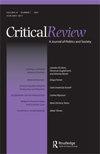认识民主的建模有多现实?
IF 1.7
3区 社会学
Q4 POLITICAL SCIENCE
引用次数: 0
摘要
“多样性胜过能力”(DTA)模型通常被解释为一种支持认知民主的机制。然而,正如各种实证和数学研究所表明的那样,如果我们试图测试该模型的现实性,结果表明它既指向民主,也指向民主。这似乎会给官僚政治留下一个优势,因为它的基本原理通常不被认为依赖于DTA,而是依赖于专业知识与做出复杂决策的明显相关性。然而,如果我们对知识民主进行同样的测试——对现实主义的测试——我们发现它也是不可持续的。这表明,基于DTA所基于的关于多样性和专业知识的抽象假设,认知民主和epistocracy都是站不住脚的。本文章由计算机程序翻译,如有差异,请以英文原文为准。
How Realistic Is the Modeling of Epistemic Democracy?
ABSTRACT The “diversity trumps ability” (DTA) model is often interpreted as a mechanism supporting epistemic democracy. However, as a variety of empirical and mathematical studies have shown, if we attempt to test the realism of the model, it turns out that it points as much toward epistocracy as democracy. This might appear to leave epistocracy with an advantage, since its rationale is not usually thought to rely on the DTA but on the obvious relevance of expertise to making complex decisions. Yet if we apply the same test to epistocracy that we should apply to epistemic democracy—the test of realism—we find that it, too, is unsustainable. This suggests that epistemic democracy and epistocracy alike are indefensible on the basis of the abstract assumptions about diversity and expertise on which the DTA is predicated.
求助全文
通过发布文献求助,成功后即可免费获取论文全文。
去求助
来源期刊

Critical Review
POLITICAL SCIENCE-
CiteScore
1.30
自引率
12.50%
发文量
17
期刊介绍:
Critical Review: A Journal of Politics and Society is a political-science journal dedicated to advancing political theory with an epistemological bent. Recurrent questions discussed in our pages include: How can political actors know what they need to know to effect positive social change? What are the sources of political actors’ beliefs? Are these sources reliable? Critical Review is the only journal in which the ideational determinants of political behavior are investigated empirically as well as being assessed for their normative implications. Thus, while normative political theorists are the main contributors to Critical Review, we also publish scholarship on the realities of public opinion, the media, technocratic decision making, ideological reasoning, and other empirical phenomena.
 求助内容:
求助内容: 应助结果提醒方式:
应助结果提醒方式:


